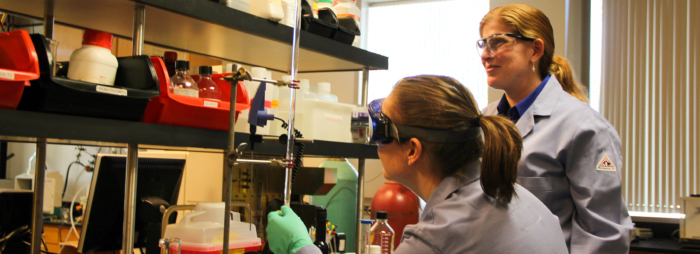
Having gone weeks without receiving an email from Rick Danheiser, MIT chemistry professor and editor-in-chief of the academic journal Organic Syntheses, Scripps Associate Professor of Chemistry Anna Wenzel thought she hadn’t won the grant she had applied for in early 2016. It wasn’t until Danheiser wrote to Wenzel he hadn’t heard from her that she realized she had won. Wenzel found the initial notification email in her spam folder, and her immediate reaction was “shock.”
Her shock soon turned into elation and relief.
“The funding climate right now is incredibly difficult. Any time I have an application that is accepted, my main emotion is immense relief,” says Wenzel.
The $8,000 Organic Syntheses grant, designed to promote undergraduate research, is one of two grants Wenzel earned this year. She also received a highly competitive $189,000 grant from the National Science Foundation.
Six students are working with Wenzel on her two grants; the funding she received supports the students’ living stipend as well as the cost of scientific chemicals and sending out samples for purity analysis. Both projects are rooted in stereochemistry, or the study of the arrangement of atoms and molecules in chemical reactions. Wenzel and her team are specifically investigating molecules’ “handedness,” which signifies their shape and three-dimensionality.
“From a medicinal standpoint, one major problem is that if you take a drug that has a left-handed component and a right-handed component, the handedness of the molecule could actually have different physiological ramifications,” Wenzel said.
For example, one handedness of a chemical called bupivacaine is an epidural; it removes pain and is often used in childbirth. The other handedness is cardiotoxic and can potentially lead to death.
The FDA requires scientists to prove that each handedness of a chiral drug (a drug that contains a left- and right-handed component) is not harmful. If one handedness is harmful, the molecule must be purified to eliminate it. Wenzel’s research seeks to employ catalysts (molecules that aren’t consumed in a reaction) that will make the chirality of a drug pure.
The four students assigned to the National Science Foundation grant are working to make amines (nitrogen containing compounds) with pure handedness. They are investigating new metals and making synthetic enzymes in order to make them pure.
For the Organic Syntheses grant, students are working on the Claisen reaction, which is a carbon-carbon bond forming reaction. With the help of Rachael Hamilton ’16, who performed the initial research, they have developed a new reaction that can make carbon-containing molecules with up to 97% pure handedness.
According to Wenzel, this is the first reaction that has been able to achieve this for an aza-Claisen reaction.
“The fact that the students were able to accomplish something that PhD students were trying to do for many years is huge,” Wenzel said. “It is really a testament to the abilities of our students to be able to do real and competitive research. That has been a huge victory for us in terms of validation.”
Though they have made exciting new developments, there have been challenges. Purification of the products has presented difficulties, as some of the protocols for making the starting materials were not as advertised. Instead of coming out as crystalline solids, the products looked like a yellow goo.
After thinking about other protocols that might be more appropriate, the students were finally able to improve the protocol last week.
The students are now in the process of looking at the limitations of the reaction, which investigates what it can do in terms of scope of the elements.
They are approaching their final goal: publication. Wenzel plans to send the paper to the journal Advanced Synthesis and Catalysis by the end of the year.
Throughout the process, Wenzel serves as a mentor and advisor to student researchers. She trains them on how to use scientific instruments, analyze and set up a reaction, purify products, and determine if they’ve made what they thought they made.
Wenzel gradually allows the students to be self-sufficient. By the time they’re seniors, Wenzel says the students have independence in the lab.
“It’s really impressive when you see someone who initially comes in not knowing how to operate the equipment to eventually acquiring enough experience where they can contribute to the project,” she says.
Unlike large institutions, students at the W.M. Keck Science Department receive ownership of their projects and can direct its future steps. The intensive training program helps students prepare for their doctoral studies.
“The awarded grants serve as testaments to me that the students are being trained well and at a level that people outside recognize,” Wenzel said. “To see my students go off with the training that they’ve had and go on to graduate school, post docs, medical careers, dental careers, that’s my biggest reward.”

